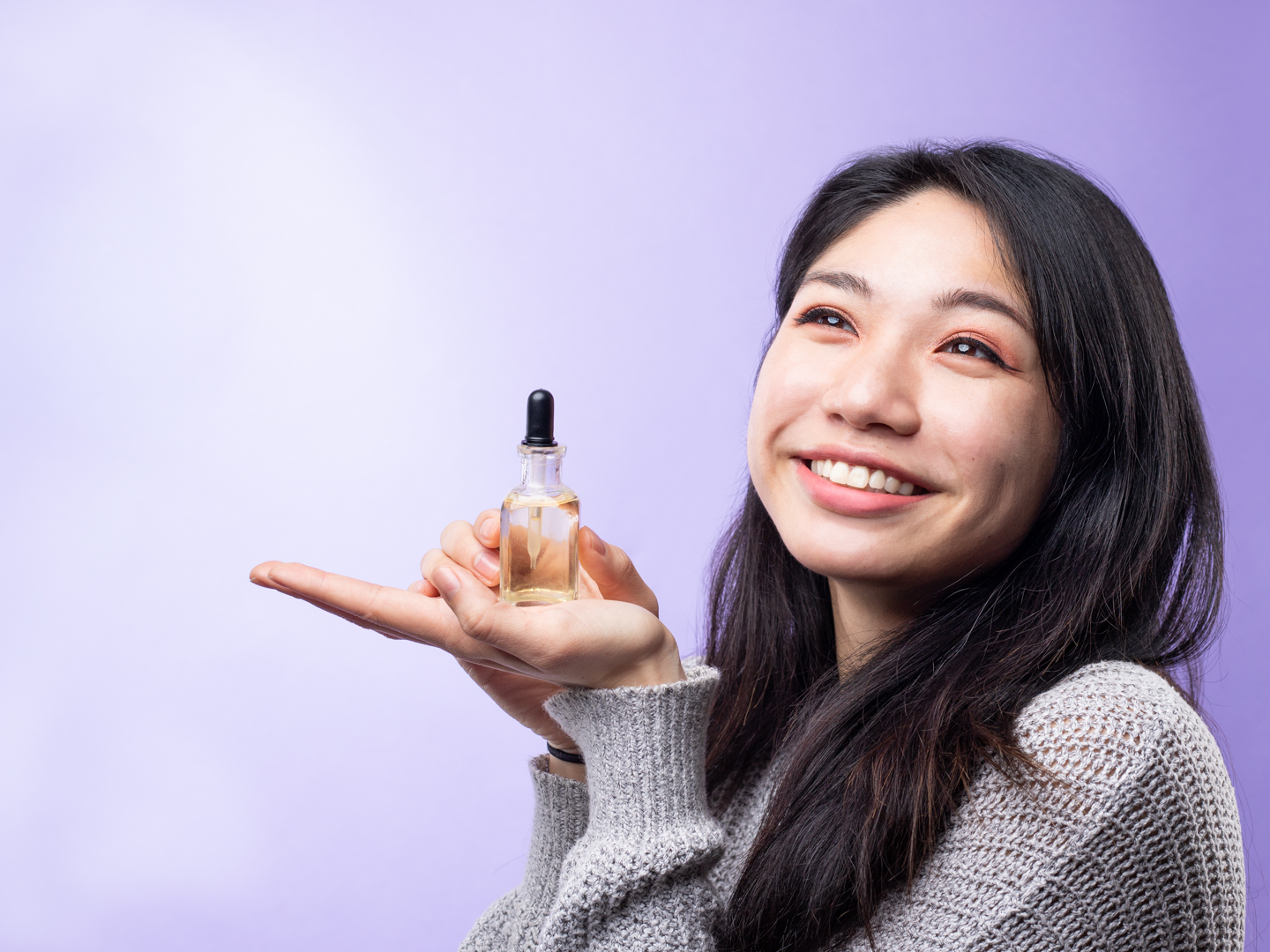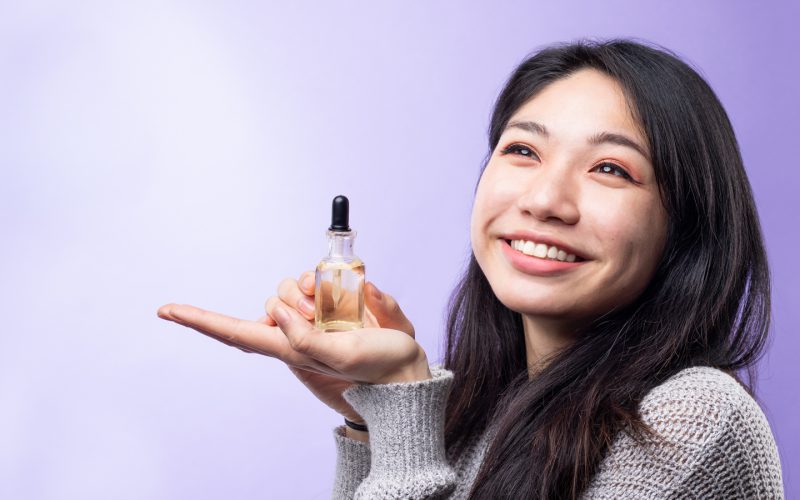This lightweight ingredient is practically a goldmine for skin health and anti-aging benefits.
 What is argan oil?
What is argan oil?
Argan oil, sometimes called “liquid gold,” is made from the kernels of the argan tree that’s native to Morocco. Traditionally, these kernels are harvested by the women of Morocco after they’ve fallen from the argan trees. In some cases, goat herds are used to help harvest the kernels and separate them from the fruit. While these traditional harvesting practices are sustainable, more modern, mechanical harvesting processes have now been introduced, threatening the natural ecosystem.
After the kernels are harvested, the argan oil is extracted via an time-intensive and difficult process. Because it’s difficult to extract oil from the argan kernels, pure, unfiltered argan oil can often be expensive. In the case of argan oil, however, a higher price tag usually means that you’re buying a higher-quality product that’s produced more sustainably.
Argan oil skin benefits
Argan oil benefits your skin, hair, and nails by conditioning and moisturizing them. Rich in vitamins and fatty acids, it can benefit a range of skin types:
-
Argan oil for acne-prone skin
Argan oil is rich in oleic acid and linoleic acids—healthy, fatty acids that can help to reduce inflammation and promote overall skin health. Acne-prone skin is often deficient in linoleic acid, so argan oil can help to replenish your skin’s stock of this nutrient.
-
Argan oil for oily skin
Argan oil is non-comedogenic, and can help to regulate your skin’s oil production. When using argan oil for oily skin, make sure to apply argan oil after thoroughly cleansing your skin, and apply only a thin layer.
-
Argan oil for dry skin
The fatty acids in argan oil help to replenish your skin’s lipid barrier, sealing in hydration. To use argan oil for dry skin, you’ll want to start with a light layer of argan oil, then an additional moisturizing cream to seal it in.
-
Argan oil for aging skin
Argan oil is rich in the antioxidant vitamin A, which is a free radical scavenger—meaning that it helps to eliminate free radicals that might otherwise cause damage to your skin cells. Argan oil both moisturizes aging skin to promote healthy skin texture, and helps to prevent future damage with vitamin A.
-
Argan oil is anti-inflammatory
Studies have found that argan oil contains a much greater amount of γ -Tocopherol than other plant oils. γ -Tocopherol is a form of Vitamin E that boasts high anti-inflammatory properties, working to soothe skin conditions, and reduce reddened or rough skin.
 How to use argan oil for skin
How to use argan oil for skin
There are plenty of different ways to experience the benefits of argan oil. And not only is it great for your skin. It can also help to condition your hair and nails! Here are some simple ways to incorporate argan oil into your daily routine:
-
Argan oil as a cleanser
You can use argan oil as the first step in your double cleansing routine. Start by applying a few drops of argan oil to the palms of your hands, and then gently work the oil over your entire face. The oil will help to remove makeup and sunscreen form your day, prepping your skin for the next step. Remove the oil with a warm washcloth, and then follow up with a gentle cleanser.
-
Argan oil as a day moisturizer
You can use argan oil as a light, day moisturizer by applying a thin layer to your skin, and gently blending it in until it’s absorbed. Follow up with sunscreen and makeup if desired.
-
Argan oil as a night moisturizer
You can also use argan oil as a night serum, allowing it to work its magic while you sleep. To make a DIY argan oil serum that really packs a punch, just combine ½ tablespoon of argan oil with 2 drops of rosehip oil. Apply the serum to freshly cleansed skin at bedtime, after applying the toner of your choice.
-
DIY argan oil face masks
To help heal extremely dry skin, you can also mix up a moisturizing DIY face mask with argan oil. Start by mashing up ¼ of an avocado, and then add ½ tablespoon of honey, ½ tablespoon of argan oil, and 2 drops of essential oil (if desired). Apply the mask to freshly cleansed skin, and allow it to sink in for 30 minutes. Then gently remove it with a warm washcloth to enjoy refreshed, re-hydrated skin.
To make a skin-conditioning face mask with argan oil, start by separating one egg yolk from the white. Keep the yolk for hair masks (or cooking!), and beat the whites with a whisk, fork, or egg-beater until they’re opaque and foamy. Drizzle ¼ tablespoon of argan oil over the egg whites, and fold the egg whites over the oil to combine. Apply the mask to freshly cleansed skin, and allow it to sink in for 30 minutes. While the argan oil softens and moisturizes your skin, the egg white will clarify and improve the appearance of large pores. To finish, remove the mask with a warm washcloth.
-
Argan oil as a lip treatment
You can also apply a small amount of argan oil directly to dry, chapped lips for a moisturizing boost. The oil will condition them while it moisturizes, resulting in soft, smooth lips.
-
After-exfoliation treatment
After exfoliating your skin, your pores are prepped to receive moisture and nutrients. This makes the moments after you exfoliate the perfect time to apply a layer of argan oil to your skin. You can also use it as a follow-up treatment after using oil-absorbing face masks such as bentonite clay masks.
Best argan oil skin care products
 Argan Oil by 100% Pure
Argan Oil by 100% Pure
- Ideal for DIY use and direct topical application
- Pump dispenser reduces mess
100% Organic Moroccan Argan Oil by ArtNaturals
- USDA-certified organic
- Sustainably sourced
Argan Oil by Majestic Pure
- Nuts are hand picked by Berber women
- Eyedropper reduces mess
Certified Organic Moroccan Argan Oil by VoilaVe Virgin
- USDA-certified organic
- ECOCERT-certified sustainable practices
- Dark bottle lengthens shelf life
Organic Argan Oil by Pura D’Or
- USDA-certified organic
- Dark bottle lengthens shelf life
Environmental impacts of argan oil
As responsible consumers, it’s important that we make ourselves aware of the environmental impacts of the products that we buy. While some websites cheerfully claim that argan oil is made by all-female cooperatives and is produced sustainably, this is an enormous over-simplification of the truth. In reality, argan oil production was once environmentally sustainable and centered around small cooperatives. Today, however, the rapidly increasing demand for argan oil has changed the way this product is made, incentivizing producers to rely upon aggressive, potentially unsustainable harvesting practices and take power out of the hands of female cooperatives.
This doesn’t mean that you can’t enjoy the benefits of argan oil in your beauty routine, though. Just make sure that the argan oil in products that your purchase is sustainably harvested and sourced using fair trade standards.
There’s a reason why argan oil is often called “liquid gold.” Packed with nutrition and easy to use, this ingredient is practically a goldmine for skin health and anti-aging benefits. If you’re interested in using argan oil as a carrier oil in conjunction with an essential oil, check out our guide to the 12 Best Essential Oils for Skin!




